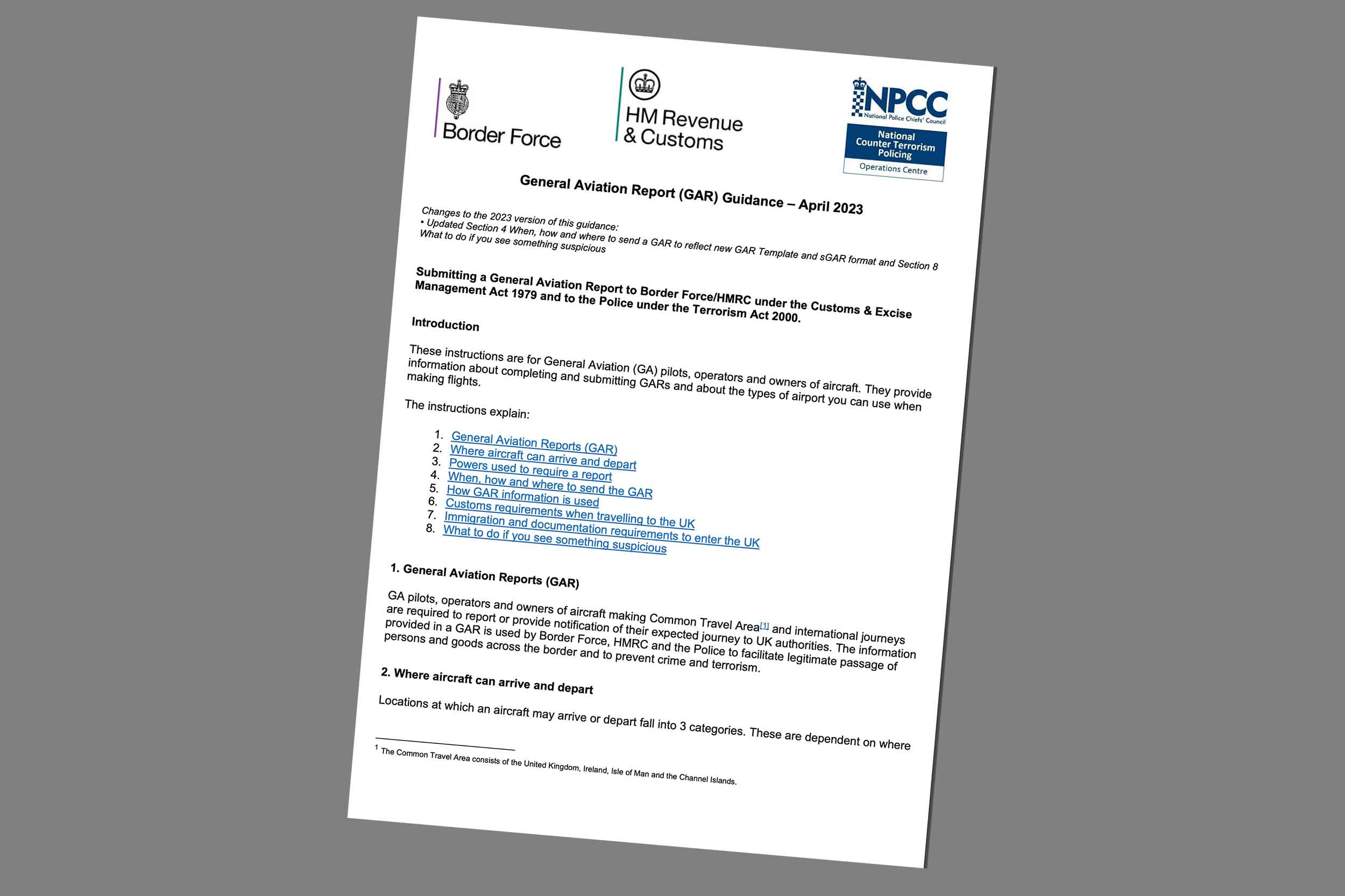“General Aviation poses unique, significant challenges to border security and for law enforcement,” says the UK government, hence the need for pilots to submit prior information about the flight.
No one doubts that but the Home Office and Border Force want to improve how they gather Advance Passenger Information (API) and recently issued a report based on a consultation they held earlier this year.
The problem for Border Force is that GA is unscheduled by nature compared to airlines, and there’s a high number of locations across the UK that commercial and private flights can arrive into and depart from.
“Maintaining a permanent Border Force and police presence at all these airfields and airstrips is impractical and disproportionate,” the Home Office admits.
“The processing of API, submitted online and in advance, would allow Border Force and other law enforcement authorities to analyse and quantify the extent of the potential threat and level of risk. It would enhance automated checking and intelligence-led decision making to improve the effectiveness with which resources are deployed to meet flights.”
The public consultation ‘General Aviation: Advance information requirements for international flights’ was published on 24 April. Views were invited from the GA sector and other interested parties on the Government’s proposal to introduce regulations which would require information about international GA flights and persons on board to be submitted online, in advance of departure for immigration and policing purposes.
The Home Office received 199 responses to the public consultation, with the majority of responses submitted by individual leisure pilots.
The Home Office has come up with some answers to the responses:
Some questioned the need for additional regulations as they considered the current customs requirement for a General Aviation Report (GAR) to be submitted 2 hours prior to departure was adequate.
Govt response: For border security and law enforcement purposes it is necessary for the Home Office to know who is intending to arrive in and who is intending to depart from the UK. The requirement to provide outbound API also enables the Home Office to ensure individuals are complying with the terms of their entry conditions.
Online submission enables automated checking and intelligence-led analysis and improves the effectiveness of which resources are deployed to meet GA flights.
Concerns were raised over the duplication of data requirements with flight plans and the consideration given to introducing a single requirement encompassing the flight plan and API.
Some respondents noted not all airfield locations have an ICAO code and alternative options other than LAT/ LONG should be made available, given the scope for error with latitude and longitude and the consequences of such errors.
Govt response: Whilst a flight plan includes information about the flight, it does not include – and does not need include – the API fields relating to persons on board. As such reliance upon the flight plan would be insufficient for border security and law enforcement purposes and adding details of all persons onboard to the flight plan is unnecessary for flight planning purposes.
The Government is committed to making reporting as straightforward as possible. We are considering the feasibility of using additional applications such as ‘What Three Words’ to assist with identifying locations where there is no ICAO code.
Respondents were asked for their views on the proposed requirement that API be submitted no earlier than 24 hours and no later than 2 hours before departure. There were concerns that the proposed timings would not allow for last minute changes. Some respondents asked for more flexible timing requirements enabling API to be submitted within 2 hours of departure and more than 24 hours before departure.
Law enforcement agencies also noted concerns about their ability, when necessary, to reach remote GA locations within 2 hours of GA flights departing from the UK.
Govt response: Within the timing requirements there is a need to balance the operational constraints of Border Force and other law enforcement agencies with flexibility for GA pilots, owners and operators. In order to fully assess each international GA flight and when necessary deploy to meet it, a minimum of 2 hours is required. Therefore, the timing requirement cannot be less than 2 hours.
However, after noting the suggestions that API be submitted earlier than 24 hours, the Government is content to extend the timing requirement to a maximum of 48 hours prior to departure. This would also give law enforcement agencies additional time to analyse the API received.

Respondents were asked about submitting API online using portals or applications. The majority felt that applications and portals were a sensible method for submitting API, providing the systems were robust and could ingest high volumes of submissions.
In the event of a technical issue, respondents mentioned the requirement to have a fallback method such as telephone or email.
Concerns were also raised about submitting API online from remote GA airfields without reliable internet connectivity or where the pilot was unable to access mobile data.
Govt response: There is an existing manual reporting process for submission in the event of technical failure. Details can be found on: General Aviation Report (GAR) Guidance – April 2023. The Government is in the process of reviewing this and will publish updated guidance in due course.
As API can be submitted in advance of departure, should pilots be concerned about a lack of internet access at remote airfields they should submit the information in advance when they do have internet access.
Operators of commercial GA flights expressed concern over liability where a third party had submitted the data on behalf of the pilot. They felt receiving an acknowledgement receipt following the submission is crucial in order to provide evidence of the operator’s submission. Operators were also concerned that the requirement to submit the data ‘no earlier than 24 hours’ would have a negative impact on staff resources.
Govt response: In relation to concerns over liability for information submitted by a third party. Where a breach of the regulations occurs, the liability would be placed upon the ‘responsible person’. In accordance with Paragraph 27BA (5) of Schedule 2 to the Immigration Act 1971, the responsible person is the owner or agent or captain.
At this stage the Government is not intending to place a requirement on commercial operators of international GA flights to provide PNR data. This may be subject to change in the future. Should this position change, the Government would engage with commercial GA operators to understand the implications for their operations.
Respondents were asked if a civil penalty regime would provide an effective incentive to comply with the reporting requirement. Some respondents felt a civil penalty regime would be an incentive for law-abiding pilots to comply. However, it was widely felt by law enforcement agencies that the proposed civil penalty of up to £10,000 per flight would be an insufficient deterrent to those who are involved in illicit activity.
Concerns were expressed over genuine mistakes. One respondent commented: “The vast majority of GA pilots comply with the rules and regulations. There may be the odd occasion when mistakes or omissions are made but not with intentional dishonesty”.
Govt response: In order to alleviate the concerns raised, a proportionate, civil penalty regime would be required. Clear guidance on its operation would be published which accounted for genuine mistakes as well as a robust assurance process to ensure consistency across all Border Force regions.
The Government is committed to keeping the maximum penalty amount under review. In instances where there is a failure to provide details of a person on board this would constitute a breach of the Authority to Carry Scheme 2023 which carries a penalty of up to £50,000.
Respondents were asked to give their views on the Government’s sGAR portal. A large number of respondents stated they had not used sGAR due to already using existing third-party applications connected to Home Office systems.
Of those who have used sGAR, feedback was generally good, with the service being referred to as “an excellent service” and one which met their needs.
There was some criticism that sGAR was not user-friendly, for example, because it requires users to acquire a short validity log-in token. A number of respondents reported issues with Border Force being unable to locate GARs that had been submitted using the system.
There were further suggestions on how the system could be improved. It was said the sGAR log in process should be adapted to enable easier log-in; users should be able to amend the information submitted (instead of cancelling and resubmitting), and the receipt confirmation must be clear which flight it relates to.
Govt response: All Government systems hosted on gov.uk are required to pass an extensive assessment process and adhere to design principles.
The issues around GAR submissions have been noted and a review of internal operational processes is taking place. This will ensure all GARs submitted using s-GAR are identified and actioned by the relevant Border Force region.
Having reviewed and considered sGAR users’ experiences, the Government has committed to making the following enhancements to the sGAR system:
- Enabling users to log-in either using the existing token or, creating a character password.
- Adding a function to give pilots, owners and operators the ability to amend existing GARs for upcoming flights.
- Including flight details in GAR receipts making it easier to distinguish between GARs.
There are further sections on The Authority to Carry Scheme, Reporting in exceptional circumstances, the Terrorism Act 2000 (‘TACT’) and the Common Travel Area, and Alternative approaches to securing the border.
The full Home Office response document can be downloaded here.













